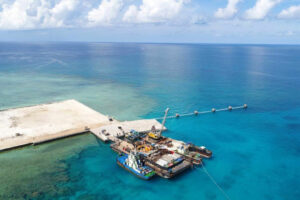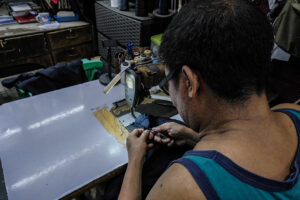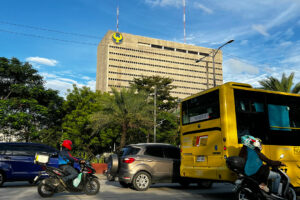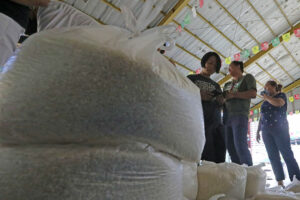Thitu Island in the disputed
South China Sea, June 9, 2020. — PHILIPPINES’ DEPARTMENT OF NATIONAL DEFENSE/HANDOUT VIA REUTERS
The Chinese recently imposed a unilateral four-month fishing ban in the South China Sea, which includes the West Philippine Sea. The ban started on May 1 and is expected to last until Sept. 16.
The Philippines has rejected and condemned this audacious act, but China’s audacity is nothing new. In the past few years and months, China has blatantly ignored the Philippines’ victory over it at the Permanent Court of Ar-bitration. Newspaper headlines have detailed one instance of aggressive behavior after another — a direct affront to Philippine sovereignty and to international law.
The reprehensible acts partake of a maritime nature because they take place in waters that have been established as legitimately the Philippines’. But it is impossible to talk about the West Philippine Sea (WPS) from a purely geopolitical/maritime point of view. All these are also grave threats to the economic order. China’s acts show a blatant disregard for the Philippines’ right to fully harness and maximize the benefits from resources rightfully with-in its Exclusive Economic Zone, as affirmed by international law and the 2016 arbitral ruling.
Our waters hold resources that support and enhance the lives of Filipinos. The WPS, rich in marine biodiversity, serves as a vital fishing ground that is the livelihood of countless Filipinos. It is also believed to contain substantial untapped reserves of oil and natural gas. This is key to achieving energy security and powering the economy in the medium and long term. Finally, the WPS is a critical maritime route, facilitating international trade and commerce.
China’s acts in the WPS pose a grave threat to the concept of the “blue economy” as detailed by President Ferdinand Marcos, Jr. during his State of the Nation Address last year. The World Bank defines the blue economy as the “sustainable use of ocean resources for economic growth, improved livelihoods, and jobs while preserving the health of the ocean ecosystem.” In fact, the Blue Economy Act has been approved by the House of Representatives and is on its second reading in the Senate.
During the recent Shangri-La Dialogue held in Singapore, President Marcos Jr. delivered a powerful message. “The life-giving waters of the West Philippine Sea flow in the blood of every Filipino. We cannot allow anyone to detach it from the totality of the maritime domain that renders our nation whole,” he said.
The question persists: What should be done about these threats to our maritime and economic space?
Continued engagement and collaboration with like-minded states appear to be the wisest move. Enhanced cooperation to ensure the achievement of both maritime and economic security is strategically necessary. These like-minded states — Australia, for instance — are in the best position to support us through these difficult times. Our two countries share robust security and economic ties, as was shown during President Marcos Jr.’s visit in March. We have long shared common interests in maintaining peace, stability, and prosperity in the Indo-Pacific region.
Stratbase ADR Institute Trustee and Program Convenor, and foreign policy scholar, Dr. Renato de Castro wrote that leveraging the country’s alliance and partnership with Australia brings forth the opportunity to build capabilities and resources for its comprehensive archipelagic defense strategy. He wrote this in his recent publication entitled “Jumpstarting Archipelagic Defense and Trilateral Security Partnership.”
Dr. De Castro will expound on his insights during a forum that will be held tomorrow, June 6, organized by Stratbase ADR Institute in partnership with the Embassy of Australia in the Philippines.
The event, entitled “Forging Bonds: Exploring the Nexus Between Maritime Security and Economic Security,” will be another opportunity for experts to gather and discuss the intimate link shared by maritime and economic security and, more importantly, how to move forward in these arenas for the benefit of the Filipino people.
It will gather stakeholders in the government, diplomatic community, the academe, and think tanks to discuss collaborative ways to ensure maritime security and its potential to boost the development of a sustainable blue economy in the West Philippine Sea.
Other discussants include Prof. Ranjit Rye, President of OCTA Research, who will explore public opinion on the West Philippine Sea dispute and China; Dr. Ma. Carmen Ablan Lagman, Full Professor at De La Salle University – Manila, who will discuss the development of a blue economy; and RADM Rommel Jude Ong (Ret), Professor of Praxis at Ateneo School of Government, who will examine the integration of alliance building and economic resilience for national security.
“The Indo-Pacific holds much promise as the fastest growing economic hub and the largest contributor to global growth. That [promise] must be kept alive,” President Marcos Jr. also said during the Singapore event.
“We recognize the importance of upholding multilateralism. It remains the single viable platform for collective action against transcendent global challenges.”
Indeed, nations that share the same values and principles need to come together and work collaboratively in order to preserve the rules-based international order. The show of unity and strength sends an unequivocal message to China that what it is doing is not only illegal but also rude, dishonorable, and morally reprehensible.
Victor Andres “Dindo” C. Manhit is the president of the Stratbase ADR Institute.





